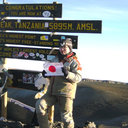Abnormalities in fatty acids in plasma, erythrocytes and adipose tissue in Japanese patients with colorectal cancer.
מילות מפתח
תַקצִיר
OBJECTIVE
In previous animal studies, we confirmed that linoleic acid (LNA) enhanced colon carcinogenesis, whereas eicosapentaenoic acid (EPA) had protective effects in azoxymethane-induced colon tumorigenesis. In regard to the protective effects of marine n-3 polyunsaturated fatty acids (PUFAs) on colorectal cancer however, evidence from epidemiological studies is inconsistent.
METHODS
In the present study we investigated the fatty acid composition in plasma, red blood cells (RBCs) and adipose tissue from Japanese patients with colorectal cancer, or benign disease.
RESULTS
Sixty-one patients with histologically-confirmed colorectal cancer and 42 patients with non-malignant disease were recruited for this study. The fatty acid composition of the total phospholipid (PL) fraction of plasma and washed RBCs was determined by gas chromatography. The fatty acid composition of the triacylglycerol (TAG) fraction of subcutaneous adipose tissue was determined in a similar manner. The EPA proportion in the plasma and RBC PL fractions was significantly lower in patients with cancer than in the controls (p<0.05). Similarly, the LNA proportion in the RBC PL fraction was lower in patients with cancer, but no changes were found in the plasma PL fraction. Arachidonic acid was the only PUFA in the adipose TAG fraction that exhibited significant differences, with higher levels in the patients with cancer than in the controls.
CONCLUSIONS
Our findings suggest that patients with cancer have abnormalities in PUFAs in the plasma PL, erythrocyte PL, and adipose TAG fractions. Further investigation is needed to clarify the differences in the results between the various fractions.



